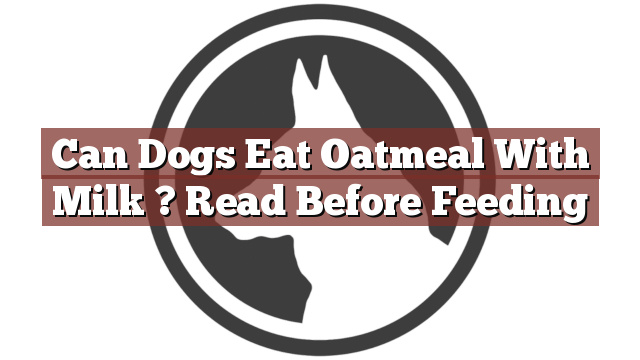Understanding Your Dog’s Dietary Needs
As a responsible pet owner, it is essential to understand your dog’s dietary needs before introducing any new food into their diet. Dogs are primarily carnivores, meaning their bodies are designed to derive most of their nutrition from meat. However, they can also consume certain plant-based foods in moderation. A balanced diet for dogs typically consists of high-quality protein, essential fats, and a limited amount of carbohydrates.
Can Dogs Eat Oatmeal With Milk? Read Before Feeding
Now, let’s address the question: can dogs eat oatmeal with milk? The answer is yes, dogs can eat oatmeal with milk, but it is important to note a few considerations before feeding this combination to your furry friend. Oatmeal, a whole grain, is a good source of fiber, vitamins, and minerals. It can provide dogs with energy and aid in digestion. Milk, on the other hand, contains lactose, which some dogs may be intolerant to. If your dog is lactose intolerant, feeding them milk could lead to digestive issues such as diarrhea, vomiting, or excessive gas.
Pros and Cons of Feeding Oatmeal With Milk to Your Dog
Pros:
- Nutritious: Oatmeal contains essential nutrients such as magnesium, phosphorus, and zinc, which are beneficial for your dog’s overall health.
- Fiber-rich: Oatmeal can help regulate your dog’s bowel movements and maintain a healthy digestive system.
- Energy source: Oatmeal provides a good source of energy, especially for active dogs or those in need of weight gain.
- Variety: Feeding oatmeal with milk can add variety to your dog’s diet and can be a helpful option for dogs with specific dietary restrictions.
Cons:
- Lactose intolerance: Some dogs are lactose intolerant and may experience digestive issues if fed milk. Monitor your dog for any adverse reactions.
- Potential allergen: While rare, some dogs may be allergic to oats or milk. If you notice any signs of allergies like itching, redness, or gastrointestinal distress, consult your veterinarian.
- High-calorie content: Oatmeal with milk can be high in calories, so be cautious when feeding it to overweight or sedentary dogs.
- Additives: Avoid adding sugar, sweeteners, or flavored oats to your dog’s oatmeal, as these can be harmful to their health.
In conclusion, consider your dog’s individual needs and consult with a veterinarian before introducing oatmeal with milk into their diet. While this combination can provide certain nutritional benefits, it may not be suitable for all dogs. It is always best to err on the side of caution and prioritize your dog’s well-being by ensuring their diet is well-balanced, consisting of appropriate amounts of protein and fats, along with other dog-friendly vegetables and fruits.
Thank you for taking the time to read through our exploration of [page_title]. As every dog lover knows, our furry friends have unique dietary needs and responses, often varying from one canine to another. This is why it's paramount to approach any changes in their diet with caution and knowledge.
Before introducing any new treats or making alterations to your dog's diet based on our insights, it's crucial to consult with a veterinarian about [page_title]. Their expertise ensures that the choices you make are well-suited to your particular pet's health and well-being.
Even seemingly harmless foods can sometimes lead to allergic reactions or digestive issues, which is why monitoring your dog after introducing any new food item is essential.
The content provided here on [page_title] is crafted with care, thorough research, and a genuine love for dogs. Nevertheless, it serves as a general guideline and should not be considered a substitute for professional veterinary advice.
Always prioritize the expert insights of your veterinarian, and remember that the health and happiness of your furry companion come first.
May your journey with your pet continue to be filled with joy, love, and safe culinary adventures. Happy reading, and even happier snacking for your canine friend!

